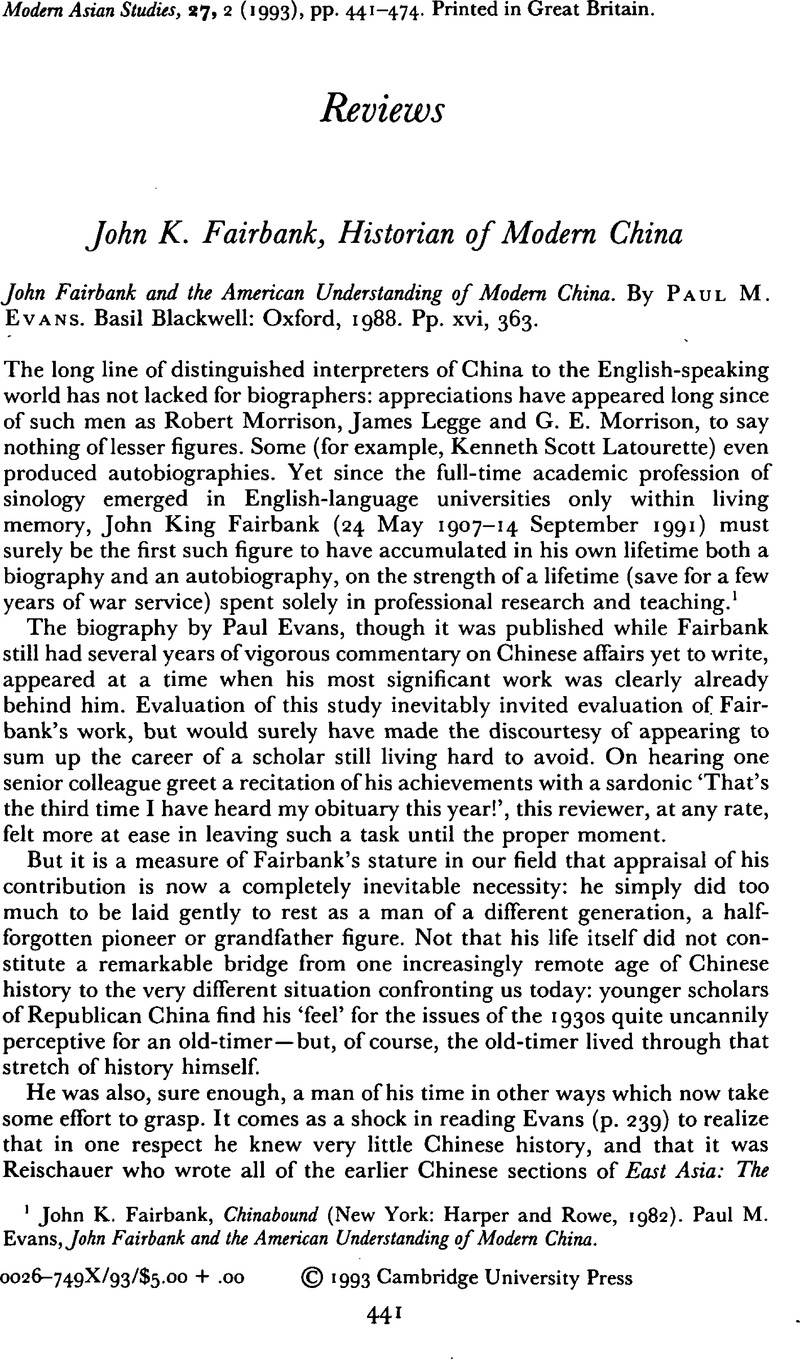No CrossRef data available.
Article contents
John K. Fairbank, Historian of Modern China - John Fairbank and the American Understanding of Modern China. By Paul M. Evans. Basil Blackwell: Oxford, 1988. Pp. xvi, 363.
Published online by Cambridge University Press: 28 November 2008
Abstract

- Type
- Reviews
- Information
- Copyright
- Copyright © Cambridge University Press 1993
References
1 Fairbank, John K., Chinabound (New York: Harper and Rowe, 1982). Paul M. Evans, John Fairbank and the American Understanding of Modern China.Google Scholar
2 Hodous, L. (ed.), Careers for Students of Chinese Language and Civilization (Chicago: The University of Chicago Press, 1933), p. 56.Google Scholar
3 See, for example, the lecture illustrating the value of Japanese scholarship by Twitchett, D. C., Land Tenure and the Social order in T'ang and Sung China (London: The School of Oriental and African Studies, 1962).Google Scholar
4 Cohen, Paul A., Discovering History in China: American Historical Writing on the Recent Chinese Past (New York: Columbia University Press, 1984), ch. one.Google ScholarCf. the remarks of Rowe, William T. on Fairbank, in John, Cannon (ed.), Blackwells Dictionary of Historians (Oxford: Basil Blackwell, 1988), p. 127.Google Scholar
5 I have in mind such studies as Dikötter, F., The Discourse of Race in Modern China (London: C. Hurst, 1992).Google Scholar
6 I have in mind such works as Henderson, John B., The Development and Decline of Chinese Cosmology (New York: Columbia University Press, 1984)Google Scholar, and Elman, Benjamin A., From Philosophy to Philology: Intellectual and Social Aspects of Change in Late Imperial China (Cambridge, Mass.: Council on East Asian Studies, Harvard University, 1984).CrossRefGoogle Scholar
7 Thus an essay first published in Life, 23 Sept. 1966, and now to be found inGoogle ScholarChina: The people's Middle Kingdom and the U.S.A. (Cambridge, Mass.: Harvard University Press, 1967), pp. 3–16.Google Scholar
8 Fairbank, John King, China Watch (Cambridge, Mass.: Harvard University Press, 1987), p. vii.CrossRefGoogle Scholar This book is primarily a collection of pieces frist published by Fairbank between 1971 and 1985, with some additional comments.
9 Thus Evans, John Fairbank, p. 17, referring both to Fairbank and to Webster.Google Scholar
10 Note e.g. the reference to Webster by Isaiah Friedman on p. 198 of ‘The McMahon-Hussein Correspondence: a Reply to Professor Arnold Toynbee's Comments’, Journal of Contemporary History 5.4 (1970), pp. 193–201.Google Scholar
11 This quotation may be found on p. 115 of Herbert Feis, ‘The Modern Far East and the Undergraduate’, in de Bary, W. Theodore and Embree, Ainslee T., Approaches to Asian Civilizations (New York: columbia University Press, 1964), pp. 107–21;Google Scholar Feis responds to Fairbank's lengthy purple passage with the observation (p. 116) ‘Must we really accomplish these feats of understanding? I presume so even though we fail’. Note that the volume as a whole gets under way (p. 3) with Arthur Wright in passing disparaging the wholw concept of history as ‘background’ to current affairs.
12 Chung-yüan, Ling-hu, ‘Fei Cheng-ch'ing yü Chung-kung kuo-shih’, Ming-pao yüeh-k'san 26.10 (10 1991), pp. 43–4.Google Scholar




